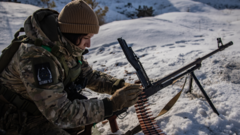A surge of discontent is emerging from Israeli reservists who demand an end to the Gaza war. In a striking shift from initial support, thousands have penned letters urging Prime Minister Benjamin Netanyahu's government to prioritize negotiations for the release of hostages held by Hamas. The sentiment among military personnel signifies a profound change, moving from a unified front against Hamas towards questioning the government's strategy and motives.
**Growing Opposition Among Israeli Reservists as Gaza Conflict Persists**

**Growing Opposition Among Israeli Reservists as Gaza Conflict Persists**
As Israeli reservists voice their dissent, pressure mounts on Prime Minister Netanyahu amidst ongoing conflict.
In recent weeks, an increasing number of Israeli reservists across various military branches have banded together, signing letters that call for an immediate cessation of hostilities and a focus on securing the safe return of the 59 hostages believed to be alive. The tone of these letters underscores a diminishing faith in the war's trajectory, a sentiment echoed by Danny Yatom, a former head of Mossad, who criticized Netanyahu for placing personal and political interests above national well-being.
The first letter emerged from a collective of air force reservists in April, imploring their peers to act before the lives of hostages are further endangered. With over 12,000 signatures now collected from across military divisions, it is clear that discontent is not confined to political dissenters, but extends into the heart of Israel’s defense structure.
Once robust, reserve troop participation has seen a concerning decline, with attendance reportedly dropping to between 50-60%. Many reservists like “Yoav,” who previously served in Gaza, voice stark disagreements with the government's approach, signaling a risk of significant support losses at a crucial moment for the Israeli military.
Compounding the issue, public sentiment appears to lean increasingly towards a ceasefire, as protests continue in cities like Tel Aviv where demonstrators demand both the release of hostages and acknowledgment of civilian casualties in Gaza. The government’s attempts to suppress imagery and discourse surrounding these tragic realities have sparked backlash, exposing fissures in societal consensus.
With Netanyahu dismissing the protests as "propaganda lies" perpetrated by a disconnected minority, the divide between governmental intentions and public opinion grows wider. Polls reflect the concerns echoed by reservists and citizenry alike; many Israelis believe that negotiating for the hostages' safety must precede continued military action, thus raising critical questions about the handling of the ongoing conflict in Gaza.
As the situation develops, the relentless pressure from within both military ranks and the general populace poses a daunting challenge to Netanyahu's administration in navigating this precarious moment in Israel's history.
The first letter emerged from a collective of air force reservists in April, imploring their peers to act before the lives of hostages are further endangered. With over 12,000 signatures now collected from across military divisions, it is clear that discontent is not confined to political dissenters, but extends into the heart of Israel’s defense structure.
Once robust, reserve troop participation has seen a concerning decline, with attendance reportedly dropping to between 50-60%. Many reservists like “Yoav,” who previously served in Gaza, voice stark disagreements with the government's approach, signaling a risk of significant support losses at a crucial moment for the Israeli military.
Compounding the issue, public sentiment appears to lean increasingly towards a ceasefire, as protests continue in cities like Tel Aviv where demonstrators demand both the release of hostages and acknowledgment of civilian casualties in Gaza. The government’s attempts to suppress imagery and discourse surrounding these tragic realities have sparked backlash, exposing fissures in societal consensus.
With Netanyahu dismissing the protests as "propaganda lies" perpetrated by a disconnected minority, the divide between governmental intentions and public opinion grows wider. Polls reflect the concerns echoed by reservists and citizenry alike; many Israelis believe that negotiating for the hostages' safety must precede continued military action, thus raising critical questions about the handling of the ongoing conflict in Gaza.
As the situation develops, the relentless pressure from within both military ranks and the general populace poses a daunting challenge to Netanyahu's administration in navigating this precarious moment in Israel's history.



















